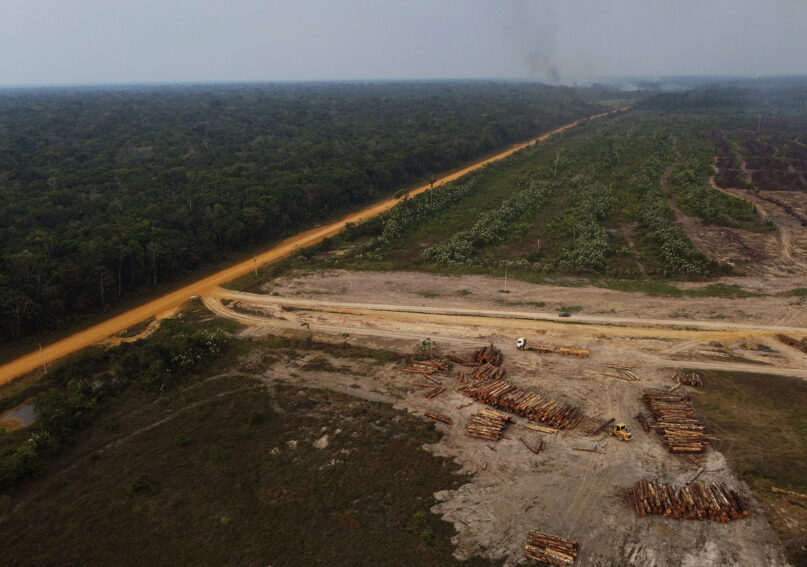(RNS) — As in the United States, Brazil’s public life has become deeply polarized along political and religious divides, with many evangelical Christians aligning with conservatives opposing progressive policies about minority rights, the role of the state in providing social services and — after former President Jair Bolsonaro’s push for aggressive development in the Amazon — protecting the environment.
The prominent exception among Brazil’s evangelical political class is Marina Silva, a vocal environmentalist with deep Pentecostal faith who is minister for environment and climate change in the left-leaning administration of current President Luiz Inácio Lula da Silva. Breaking that mold has come at the cost of savage treatment by her fellow Christian politicians.
RELATED: Brazil’s Lula issues letter to evangelicals to allay concern
In May, a week after Brazil’s Senate approved a bill — dubbed the “devastation bill” by critics — that would lift many regulations on development in the Amazon and other ecosystems, Silva was summoned to appear before the legislative body, ostensibly to discuss oil exploration at the mouth of the Amazon River. But the session quickly took a different turn. Led by Sens. Marcos Rogério, a Pentecostal who is a member of the Evangelical Parliamentary Front, and Plínio Valério, a Catholic, the hearing turned into a political ambush, with the bill’s supporters telling Silva to “know her place.”
When she challenged them to observe decorum, a senator responded that “the minister does not deserve respect.”
Silva ended the session by walking out, and the senators’ attacks were later condemned by human rights organizations that deemed them racist and misogynistic. But they were also moot: A reconciled version of the “devastation bill” passed a final vote Thursday (July 17). While some lawmakers opposed to the bill argue that parts of it are unconstitutional and say the matter should be brought before the Supreme Court, Lula is under intense pressure from Congress to approve it, over Silva’s objections.

An area of forest on fire near a logging area in the Transamazonica highway region, in the municipality of Humaita, Amazonas state, Brazil, Sept. 17, 2022. (AP Photo/Edmar Barros, File)
Silva is not only an outlier due to her faith. While most politicians from Brazil’s northern Amazon region are aligned with local elite interests, Silva, 67, a Black woman from Acre, comes from a community of seringueiras — rubber tappers at the bottom of the social ladder. She learned to read and write only at the age of 16, in a convent school. Before that, she learned Catholic catechism from her grandmother by looking at pictures.
The Catholic Church introduced her to liberation theology and she almost chose the life of a nun, but left the convent to dedicate herself to union struggles and political activity. At the age of 40, she converted to Pentecostalism and has been a member of the Assembly of God church ever since.
Her political trajectory has been marked by not only environmental advocacy but a strong ethical stance that has earned her international recognition, and support for her first presidential campaign in 2010.
Some evangelicals backed her as well, though Luciana Petersen, director of the progressive group New Evangelical Narratives, said their interest was less about shared concern for environmental issues than their hope she would represent their interests in power. “It was an attempt to see Marina as someone who would carry evangelical agendas and establish a Christian government,” explained Petersen.
Silva, however, refused to turn her personal faith into a political platform, defending the divide between religion and institutional politics. This has been a consistent position throughout her career. “The instrumentalization of faith by politics ends up creating a series of anomalies that impose religious issues on political debate — which should be focused on the public interest,” the minister said in a 2022 interview.

Brazilian Environment Minister Marina Silva speaks during an event to announce measures to prevent and control deforestation in the Amazon on World Environment Day in Brasilia, Brazil, June 5, 2023. (AP Photo/Gustavo Moreno)
Her stance disappointed conservative evangelical leaders looking for a leader to endorse their moral and cultural priorities. “There was a sense of letdown from some evangelical Christian sectors because she didn’t embrace conservative causes,” Petersen said.
As Silva ran again in 2014 and 2018, losing each time, evangelicals shifted their support to Bolsonaro, a Catholic former military officer who emerged as a vocal defender of the right’s so-called Christian values. As Bolsonaro and his followers questioned the faith of evangelicals who voted for Lula, Marina endorsed the left-leaning president against Bolsonaro, whose disregard of environmental concerns pulled evangelicals further right on the issue.
Though Lula regained the presidency in 2022, the “devastation bill” had already passed the House of Deputies under Bolsonaro and has survived so far on claims that it will cut red tape in the licensing process for construction projects. But Felipe Storch, an environmental policy and management specialist, said the real effect of the bill will be “to weaken the law, taking risks that primarily affect local populations with less power.”
Storch noted the paradox of dismantling environmental legislation in the same year that Brazil will host COP30, the international climate change conference, in Belém, in the heart of the Amazon. More than a diplomatic event, the conference is seen as a strategic opportunity to attract philanthropic and private investments for sustainable economic alternatives in the region.
Despite the Brazilian left’s return to power, the current Congress is the most conservative since redemocratization — a legacy of the Bolsonarist movement and its strong support among evangelicals. As a result, Silva’s political influence has been increasingly constrained.

A supporter of Jair Bolsonaro wears a crucifix necklace over a shirt with his likeness prior to Bolsonaro’s inauguration as Brazil’s president, in Brasilia, Brazil, on Jan. 1, 2019. (AP Photo/Silvia Izquierdo, File)
A study by Brazil’s Institute of Religion Studies, known as ISER, found that many evangelicals do express concern about environmental degradation, even framing it as a form of sin. However, as Carlos Silveira of the United Nations’ Interfaith Rainforest Initiative noted, these views aren’t much different from the national average.
A 2024 study by ClimaInfo showed that 97% of Brazilians notice the impact of the climate crisis in their daily lives. As Silveira notes, it isn’t faith that drives this environmental awareness; it stems from a broader cultural common sense that, while present, remains too weak to spark large-scale action against systemic environmental threats.
Isabel Pereira, coordinator of ISER’s Faith in the Climate program, agreed.
“We have been experiencing extreme climate events in Brazil. Evangelicals, like the rest of the Brazilian population, have also been affected by floods, droughts, landslides, extreme temperatures, etc.,” she told RNS. “This is not disconnected from the results of our research, among evangelical churchgoers. Among the people interviewed, 70% agree that we are in a situation of global climate crisis.”
RELATED: Far-right Christians blame Madonna’s ‘satanic’ concert for floods in southern Brazil
Many of Brazil’s evangelicals believe climate change is caused by human actions and reflects the sinfulness of humanity on Earth. Some even see it as a sign of the end times and the return of Jesus. Yet this theological interpretation does not necessarily translate into political engagement or collective action.

People ride bikes near signage for the upcoming COP30 U.N. Climate Summit in Belém, Brazil, March 23, 2025. (AP Photo/Jorge Saenz)
Still, according to ISER’s study, some evangelicals believe that the government holds primary responsibility for addressing environmental issues and that churches should speak out more. But environmental concerns rarely shape their voting behavior.
Some Brazilian nonprofits, such as Renew Our World and Nós na Criação (We in Creation), organize evangelicals around environmental issues; others, like Novas Narrativas Evangélicas (New Evangelical Narratives), integrate concern for the environment into a broader social justice agenda. Phelipe Marques, one of the leaders of Renew Our World Brazil, points out that evangelicals tend to focus on individual responsibility for the environment — for example, managing household waste — but lack awareness about the importance of political participation to drive change.
Most churches, Marques notes, don’t include climate in their programming, and leadership tends to resist the agenda.
Lucas Louback, advocacy manager at the activist network NOSSAS, told RNS, “A large portion of the evangelical community has not embraced a theology of creation or care for the environment.” Instead, he said, many adopt an apocalyptic view that the end is near. “So, there’s no need to care for the environment: the sky, the land, forests, rivers or oceans,” he said.
The Bolsonaro political movement exploits this religious worldview, according to Louback. “This is a project that uses the Bible and evangelical religion as instruments of power,” he said.
Silva, meanwhile, resolutely keeps her faith out of her politics, except to serve as an example that Christian belief need not align with environmental neglect. At another tense congressional hearing in early July, in which she was again criticized for her firm stance on environmental protection, Silva said: “This morning I said a long prayer and asked God to give me calm and tranquility. I am at peace.”





